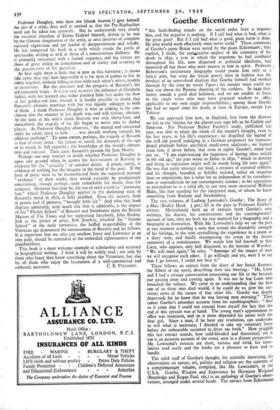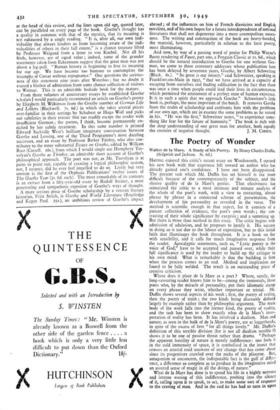Goethe Bicentenary
" ALL fault-finding attacks on the social order have a negative bias, and the negative is nothing. If I call bad what is bad, what is the great gain? But if I call bad what is good, great harm is dont. He who would work effectively must never scold." These comments of Goethe's upon Byron were noted by the pious Eckert-n=1i; they explain, I think, the comparative neglect of the centenary of his death in 1832, a year in which the negations he had combated throughout his life, now disguised as politicial idealisms, had mastered all but those who were nearest to him in spirit. Professor Robertson's anniversary biography could praise him only as a lyrical poet, but even the lyrical poetry then in fashion was the
product of an unresolved dualism that Goethe himself had worked through by the time he wrote Tasso ; his mature voice could not then rise above the Byronic shouting of the scolders. In 1949 their frenzy sounds a good deal hollower, and we are readier to listen to the single voice who may have practical wisdom to offer, applicable to our own single responsibilities ; among these Goethe has had no equal since his death, at least in Europe, except Leo Tolstoy.
We can approach him now, in England, free from the distrust we felt in the 'thirties for the plaster-cast sage left us by Carlyle and Emerson. For Professor Barker Fairley's study, published last year, was able to relate the whole of the master's thought, even to his last years, to his life's experience ; he dispelled the legend of the stiff old pontiff indulging in a German propensity for transcen- dental platitude before uncritical small-town adulators ; we learned from him, if never before, that even at eighty Goethe's mind had • not set. " I am experiencing the happiness of having ideas unfold in my old age," the poet wrote to Zelter in 1830, "which to develop and bring to realisation might well be worth living life over again." He was that rarity amongst our kind, a creature of repeated rebirths, and his thought, founded, as Schiller insisted, rather on intuition than on empiricism, has a value for us independent of its corrobora- tion or contradiction by our contemporary science ; in his opposition to rationalism he is a solid ally to our own more mercurial William Blake, like him standing for the integrated man, of whom he knew something from Boehme and Swedenborg.
The two volumes of Ludwig Lewisohn's Goethe ; The Story of a Man (Bodley Head. 3 gns.) fill in the gaps in Professor Fairley's picture. Meticulously built up of extracts from Goethe's own writings, his diaries, his conversations and his contemporaries' account of him, they are both the raw material for a biography and a biography in themselves. With Mr. Lewisohn's help we see the poet at one moment scrawling a note that reveals the disorderly strength of his feelings, in the next crystallising the experience in a poem or a diary note, and finally recomposing the event in the frozen symmetry of a reminiscence. We watch him bid farewell to that Lotte, who appears, only half disguised, as the heroine of Werther. "We will meet again," he cries. " Amongst all the images of men we will recognise each other. I go willingly and yet, were I to say that I go forever, I could not bear it."
There follows an extract from the diary of her fiancé Kestner, the Albert of the novel, describing their last meeting : "He Lotte and I had a strange conversation concerning our life in the beyond, our passing away and coming again. It was not he but Lotte who : broached the subject. We came to an understanding that the first one of us three who died would, if he could do so, give the sur- vivors news of the nature of that other life. Goethe was deeply depressed, for he knew that he was leaving next morning." Then comes Goethe's smoother account from his autobiographies: " And so it came that I could not conceal from myself the fact that the end of this episode was at hand. The young man's appointment to office was imminent, and on it alone depended his union with the dear girl. Since a man, if he have any resolution, can undertake to will what is necessary, I decided to take my voluntary leave before the unbearable occurred to drive me forth." How priggish this last extract sounds, how cold-blooded and theoretical, yet it too is an accurate account of the event, seen in a distant perspective. Mr. Lewisohn's extracts are short, various and vivid, his trans- lations read easily and the books are a pleasure to have and to handle.
The solid stuff of Goethe's thought, his scientific theorising, his observations on nature, art, politics and religion are the contents of a complementary volume, compiled, like Mr. Lewisohn's, in the U.SA. Goethe, Wisdom and Experience by Hermann Weigand (Routicdge and Kegan Paul. ifis.) is an anthology of Goethe's obser- vations, arranged under several heads. The extract from Eckermann
at the head of this review, and the lines upon old age, quoted liter, can be paralleled on every page of the book. Goethe's thought has a quality in common with that of the mystics, that its meaning is not exhausted by a single reading. " It is, after all, our own indi- viduality that always hinders us from becoming aware of the indi- vidualities of others in their full extent," is a chance treasure lifted by Professor Weigand from a letter to von Knebel. Not all his finds, however, are of equal value ; indeed, some of the grander statements taken from Eckermann suggest that the great man was not above a leg-pull. " Roman history is beginning to lose its meaning for our age. We have become too humane to contemplate the triumphs of Caesar without repugnance." One questions the serious- ness of this statement nine years after Waterloo ; but no doubt it roused a blather of admiration from some chance collection of visitors to Weimar. This is an admirable bedside book for the mature.
From three volumes of anniversary essays by established Goethe' scholars I would particularly recommend an article on Goethe's poetry by Elizabeth M. Wilkinson from the Goethe number of German Life and Letters (Blackwell. 75. 6d.) in which she takes several pieces over-familiar in their settings by Schubert or Hugo Wolf and picks out subtleties in their texture that too readily escape the reader with insufficient German ; the poems, I think, become permanently en- riched by her subtle treatment. In this same number is printed Edward Sackville West's brilliant imaginary conversation between Goethe and Lessing, one of the Third Programme's most dazzling successes, and an essay by Professor Barker Fairley, who also con- tributes to the more substantial Essays on Goethe, edited by William Rose (Cassell. i6s.), from which I would single out Humphrey Tre- velyan's Goethe as Thinker, an admirable short account of Goethe's philosophical approach. The poet was not, as Mr. Trevelyan is at pains to point out, capable of creating a logical philosophic system, nor, I suspect, did he ever feel impelled to do so. Lively but very uneven is the first of the Orpheus Publications' twelve issues of The Goethe Year (3s. 6d. each). The most remarkable of its contents is an extract from a fifty-year-old essay by Rudolf Steiner, a most penetrating and sympathetic expositor of Goethe's ways of thought. A more serious piece of Goethe scholarship by a veteran literary historian, Fritz Strich, is Goethe and World Literature (Routledge and Kegan Paul. 255.), an ambitious review of Goethe's impact
abroad ; of the influences on him of French tlassicists and Engliils novelists, and of his own hopes for a future interdependence of national literatures that shall not degenerate into a mere cosmopolitan smart- ness. The writing and construction of the book are heavy-handed, the material, however, particularly in relation to the later poetry, most illuminating.
And now, by way of a passing word of praise for Philip Wayne's fluent rendering of Faust, part one, a Penguin Classic at is. 6d., which should be the natural introduction to Goethe for one without Ger- man, we come to three centenary addresses whose publication here has been delayed by seventeen years, Goethe, by Albert Schweitzer
(Black. 6s.). So great is our misery," said Schweitzer, speaking in Frankfort-on-Main in x932, " that we have arrived at a capacity of escaping from ourselves and finding edification in the fact that there was once a time when people could lead their lives in circumstances which permitted the attainment of a perfect state of human existence. It is in such a spirit that we approach Goethe." Schweitzer's little book is, perhaps, the most important of the batch. It removes Goethe from the realm of scholarship and confronts him with the problems of our own age, which are in essence the same problems as he sensed in his. "He was the first," Schweitzer notes, " to experience some- thing like fear for the future of humanity." The book is rich with the deep understanding of one great man for another, both equally















































 Previous page
Previous page